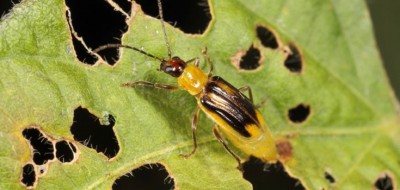Herbicide-Resistant Insects Are Destroying GMO Crops Like Never Before
So biotech tries to make even stronger toxic crops, chemicals

Bt corn was originally created, or so Monsanto claims, to eradicate a farming nuisance known as rootworm. But as evidence from a GMO corn lab comes in, we are learning how the pests are living the lives in fields planted with GM Bt corn seed.
In 2011, a cornfield planted in Iowa with Bt corn was found to be completely decimated by rootworm. A study, just published in the Proceedings of the National Academy of Sciences, describes the western corn rootworm’s rapid evolution after dining on the engineered crop.
The study’s lead author, Aaron Gassmann, states that:
“The widespread planting of crops genetically engineered to produce insecticidal toxins derived from the bacterium Bacillus thuringiensis (Bt) places intense selective pressure on pest populations to evolve resistance.
Western corn rootworm is a key pest of maize, and in continuous maize fields it is often managed through planting of Bt maize. During 2009 and 2010, fields were identified in Iowa in which western corn rootworm imposed severe injury to maize producing Bt toxin Cry3Bb1. Subsequent bioassays revealed Cry3Bb1 resistance in these populations.
Here, we report that, during 2011, injury to Bt maize in the field expanded to include mCry3A maize in addition to Cry3Bb1 maize and that laboratory analysis of western corn rootworm from these fields found resistance to Cry3Bb1 and mCry3A and cross-resistance between these toxins.
Resistance to Bt maize has persisted in Iowa, with both the number of Bt fields identified with severe root injury and the ability western corn rootworm populations to survive on Cry3Bb1 maize increasing between 2009 and 2011.”
The authors also found that not only did the rootworm thrive in Bt corn fields, but the pest had the potential to “develop resistance rapidly” when Bt crops don’t produce a high enough level of Bt toxin, and therefore would require farmers to use more pesticides to eradicate the pest.
In short, Bt corn didn’t eradicate the pest it was meant to destroy; it only made it stronger, thereby causing even more pesticide use. Sounds like a perfect biotech creation made in cahoots with companies that sell chemicals for a living – and yet we trust them to make our food?
Additional Sources:
Photo by Joseph Spencer, INHS
Follow us: @naturalsociety on Twitter | NaturalSociety on Facebook

